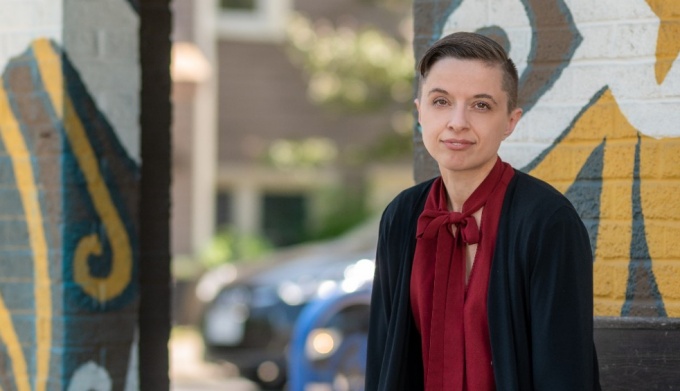Why I'm Here: Meet our Students

Sarah Richards-Desai, PhD Candidate
by Catherine Donnelly
Embracing change and remaining focused are two kinds of experiences Sarah Richards-Desai (PhD [anticipated] ’22, MSW ’16) navigates as she completes her graduate work at the University at Buffalo.
Richards-Desai initially chose UB because the Buffalo area supports several refugee communities. As she advanced through her MSW studies, she realized that she could evolve her research interests through a concurrent PhD program. As an MSW student, she led a study of students’ and faculty’s perceptions of human rights curricula, and assisted in an R01 longitudinal addictions study. These experiences solidified her passion for research—particularly among marginalized populations. Her activity with grassroots organizations informs her direction and even provides opportunities for recruiting participants.
“An important aspect of my research is exploring refugee women’s capabilities and social capital—the resources they access through community networks. People who are forcibly displaced have also been separated from key assets, information, and support,” said Richards-Desai. “While the current crises have been unexpected for us all, they may have offered an opportunity to understand how people—particularly refugees—network and build connections.”
Through the pandemic, Richards-Desai realized its increasing impact on refugee families. She shifted to videoconference interviews, noticing how many women were trying to manage children’s remote learning, household tasks, and their own work. “US resettlement policies promote almost immediate self-sufficiency for refugees, without much attention to the quality of available jobs, access to childcare, or the refugees’ own desires. Many points of connection, such as houses of worship and community centers, were closed due to COVID-19, disrupting support networks. As I reconnect with these individuals, I expect my future research will confirm a gendered experience of pandemic-related disruption—and a need for more services to help families in these communities.” There were many windows into communal resilience and strength as well; Richards-Desai upholds this as a critical research and practice element.
Richards-Desai’s investigations compare advanced statistical analyses using large public data sets about refugee populations alongside the qualitative data she collected herself through interpreters. “I am curious about how multifaceted gender roles and policy environments impact integration,” she said. “The literature often constructs refugee women as homogenous, but we are seeing how diverse their backgrounds can be.” Another goal of Richards-Desai’s work is to focus on women’s self-identified social and economic goals without replicating oppressive colonial mentalities in US immigration policy.
Now as she approaches her dissertation defense, Richards-Desai is exploring communities, literal and academic, which will allow her to share her worldview, and teach others to engage more fully with families who have refugee backgrounds. “I hope to continue my research in an inclusive, diverse academic environment—one that prepares social work students to engage in practice critically and with cultural humility, while also building social welfare science to inform evidence-based practices and scholarship,” she said. “For me, anti-racist social work practice and emancipatory pedagogical methods go hand-in-hand.”